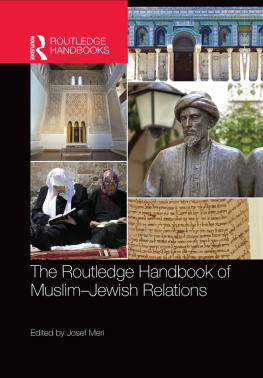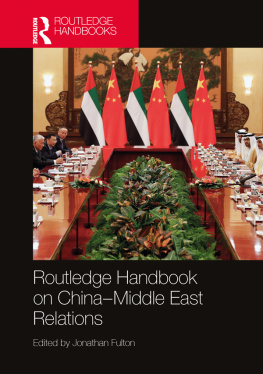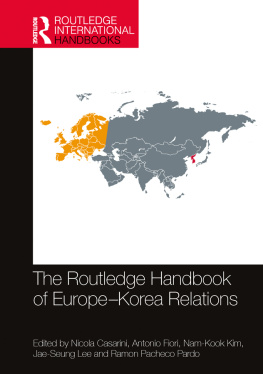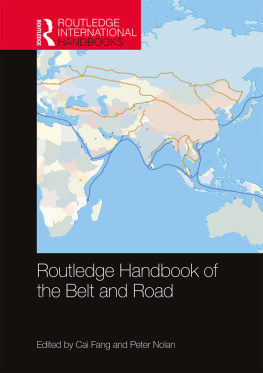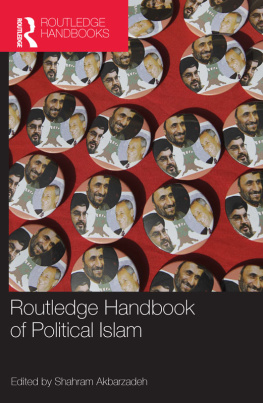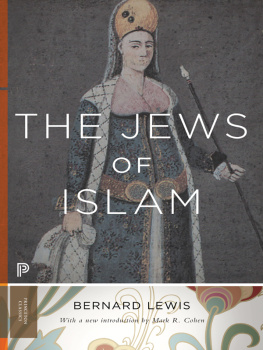Meri - The Routledge Handbook of Muslim-Jewish Relations
Here you can read online Meri - The Routledge Handbook of Muslim-Jewish Relations full text of the book (entire story) in english for free. Download pdf and epub, get meaning, cover and reviews about this ebook. City: New York;NY, year: 2016, publisher: Taylor & Francis Group;Routledge, genre: Politics. Description of the work, (preface) as well as reviews are available. Best literature library LitArk.com created for fans of good reading and offers a wide selection of genres:
Romance novel
Science fiction
Adventure
Detective
Science
History
Home and family
Prose
Art
Politics
Computer
Non-fiction
Religion
Business
Children
Humor
Choose a favorite category and find really read worthwhile books. Enjoy immersion in the world of imagination, feel the emotions of the characters or learn something new for yourself, make an fascinating discovery.
The Routledge Handbook of Muslim-Jewish Relations: summary, description and annotation
We offer to read an annotation, description, summary or preface (depends on what the author of the book "The Routledge Handbook of Muslim-Jewish Relations" wrote himself). If you haven't found the necessary information about the book — write in the comments, we will try to find it.
Meri: author's other books
Who wrote The Routledge Handbook of Muslim-Jewish Relations? Find out the surname, the name of the author of the book and a list of all author's works by series.
The Routledge Handbook of Muslim-Jewish Relations — read online for free the complete book (whole text) full work
Below is the text of the book, divided by pages. System saving the place of the last page read, allows you to conveniently read the book "The Routledge Handbook of Muslim-Jewish Relations" online for free, without having to search again every time where you left off. Put a bookmark, and you can go to the page where you finished reading at any time.
Font size:
Interval:
Bookmark:
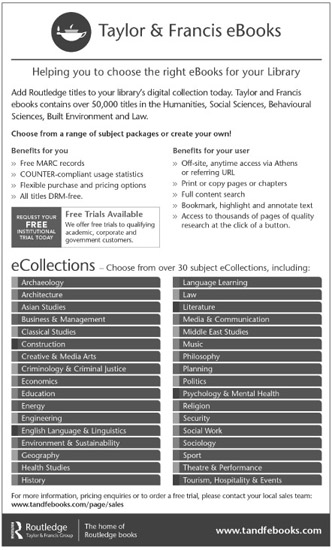
Ahd al-Amn (Arab. Pact of security) Referred to as the Fundamental Pact, a Tunisian decree in 1857 that proclaimed full equality for religious minorities.
adab Arabic anecdotal prose literature, often consisting of compilations in the field of Arab and Bedouin identity; ranges from tribal history, for instance pre-Islamic tribal battle days, to Arabic culinary customs and courtly life habits: a kind of conversation lexicon of Arabic civilization. The word adab comes indirectly from Arabic dab (habit, custom, pl. db ),of which it is a retroformation; db nowadays also means literature. In Hebrew, sometimes musar (instruction, education) is seen as a Hebrew pendant of the term referring to a Hebrew context.
ahl al-dhimma (Arab. The People of the Dhimma (protected people) Usually refers to the Jews, Christians, and Sabeans living within Islamic domains.
ahl al-kitb See People of the Book.
al-Andalus The Iberian Peninsula that was under Muslim rule from 7111492 CE .
Alhambra Palace Palace in Granada, built by the Nasrid dynasty in the thirteenth and fourteenth centuries; considered the peak of Iberian-Islamic architecture and a major influence on Iberian Jewish architecture.
al-nsikh and wal-manskh (Arab. The abrogating and the abrogated) Theory in Quranic exegesis by which contradicting legal content is reconciled by understanding that some Quranic verses cancel the legal rulings of others.
al-yahd al-Arab See Arab Jews, Mizrai.
aniconism Opposition, usually religious, to the use of figurative images in art, or idols when used in a more restrictive sense.
Arab Jews Refers to Jews who identify themselves or are identified by others as Arab or belonging to the Arab nation, an identity that developed in the Middle East, especially in Iraq, and some descendants of Jews from Arab countries. (See also Mizrai.)
asbb al-nuzl (Arab.) Occasions of revelation, sometimes also translated as reasons of revelation or contexts of revelation of the Quran. These usually consist of either athar or adth that narrate the circumstances surrounding specific verses.
athar An oral report that can be traced back to one of the companions of the Prophet Muhammad or their immediate successors. These can contain narrative expansions on verses, anecdotes, or legal material.
atomism The dominant cosmological view among Islamic philosophers that the universe consists of atoms that cannot be further subdivided.
Bayt al-ikma An academy of higher learning established under the Abbsid caliph Hrn al-Rashd (r. 786809), which attracted Muslim, Christian and Jewish scholars, translators, poets, theologians and scientists and contained many manuscripts in such diverse areas as philosophy, mathematics, astronomy, engineering and medicine.
Bedouin A rural, desert-dwelling Arab.
Bezalel Ancient Israelite artisan responsible, according to the Bible, for the construction of the Ark of the Covenant, the tent of meeting, and its ritual implements; praised in the Book of Exodus for being imbued with divine spirit, with ability, intelligence, and knowledge in every kind of craft (Exodus 31.3).
bi-l kayfa (Arab. Without knowing how) Expression used in Islamic theological texts to refer to God and His attributes without anthropomorphizing.
bimah (or bima or bema) Raised area or platform located in the center or at the front of a synagogue, from which prayers or readings are delivered.
Book of Esther A book in the Hebrew Bible telling the story of the beautiful heroine Esther who helps deliver the Jews in Persia from massacre at the hand of Haman. These events are celebrated by Jews at the festival of Purim, during which a scroll (megillah) containing the story is read.
Cadima Zionist organization run by the Jewish Agency in Casablanca that facilitated immigration to Israel from 1949 to 1956.
communitas (Latin) Adapted by the anthropologist Victor Turner to describe the unmediated state whereby individuals suspend their identities and come together for a common purpose or goal. This may be spontaneous, as in the case of pilgrimage or public processions.
Constitution of Medina The oldest known medieval constitution, drafted by the Prophet Muhammad; accords the Muslim and Jewish tribes rights of mutual defense in return for their loyalty.
convivencia (Spanish: Living together) Coined by the Spanish philologist and historian Amrico Castro in 1948 to describe the state of coexistence and cultural exchange between Jews, Christians, and Muslims in medieval Iberia.
Crmieux Decree The decree of 1870 that granted Algerian Jews French citizenship.
dhimma A social contract that Ottoman rulers afforded to Jews, Christians, and Sabeans guaranteeing them the protection of life and property and freedom of worship in return for the payment of the poll tax (see jizya). Individuals from these religious communities are collectively referred to as dhimms (sing. dhimm). The situation in which a dhimm lives has been called dhimmia.
Diaspora The dispersion of Jews throughout the world from the land of Israel, interpreted by Zionism as exile. For Palestinians, their displacement from their homeland as a result of wars in 1948 and 1967.
Dome of the Rock The earliest Islamic monument (692695 CE ), built on the then long-abandoned site of the Temple of Solomon and often linked with the Night Journey of the Prophet Muhammad.
Dnmesc (Turkish: convert) Crypto-Jews and followers of the false messiah Shabbetai Zevi (d. 1676) in seventeenth-century Ottoman Anatolia and Salonica, who outwardly converted to Islam but privately retained Jewish customs and practices.
Dura-Europos Roman city in eastern Syria in which a third-century CE synagogue was discovered in 1932 containing figurative murals that fundamentally changed perceptions about the visual culture of Jews in antiquity.
faqh An expert in fiqh, or Islamic jurisprudence.
Farhd Riots in Baghdad in June 1941 that followed a failed pro-German military coup, in which about 170 Jews and those who tried to protect them were killed.
Geist (German: soul or spirit) In Hegel, the driving force of history. Hegel described various forms of Geist, including the distinctive Geist of a people.
gemara Part of the Oral Torah, consisting of commentary on the Mishnah, dating to the Amoraic period (200500 CE ). Together, the Mishnah and the gemara form the Talmud.
Great Mosque of Crdoba Built between the eighth and tenth centuries, this was the most important mosque in Islamic Iberia and the site of many later Christian additions.
adth An oral report of the sayings, actions, and tacit approvals of the Prophet Muhammad. They each consist of a chain of transmission (isnd) and the content (matn) of the report.
Hakham-bashi, Hahamba The title of the chief rabbi of the Ottoman Empire, appointed by the Ottoman state from 1835, and of the chief rabbis of the provinces.
halakhah (var. halacha) Jewish religious law, as derived from the Torah, Talmudic and rabbinic law.
ams An acronym for the Islamic Resistance Movement formed during the first Intifada in 1987 with links to Egypts Muslim Brethren and not a member of the PLO. Since 2007, it has ruled over the Gaza Strip.
Font size:
Interval:
Bookmark:
Similar books «The Routledge Handbook of Muslim-Jewish Relations»
Look at similar books to The Routledge Handbook of Muslim-Jewish Relations. We have selected literature similar in name and meaning in the hope of providing readers with more options to find new, interesting, not yet read works.
Discussion, reviews of the book The Routledge Handbook of Muslim-Jewish Relations and just readers' own opinions. Leave your comments, write what you think about the work, its meaning or the main characters. Specify what exactly you liked and what you didn't like, and why you think so.

